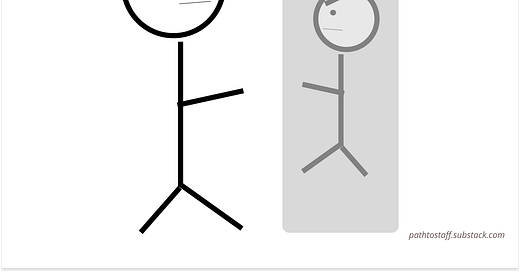Stop Trying To Be Right
A crucial mistake that most engineers make that prevents their advancement
Welcome to Path to Staff Engineering! I’m Sidwyn, and I will teach you skills needed to level up to the Staff level faster. If it's your first time here, subscribe to continue receiving this free content.
As engineers, we believe we're always right.
We must use NoSQL instead of MySQL when picking databases. We must use Python over PHP. We must accomplish this migration before we can take on a new feature.
We want to be right.
We're afraid of backing down. Afraid of bruising our egos.
We stick to our guns and refuse to reason objectively, even when we're wrong.
Here's a new way to reframe these situations and advance at work.
The method is simple: get comfortable with being wrong.
How to get comfortable with being wrong
Getting comfortable with being wrong is very hard. No one likes to be called out.
But here's a three-step process to handle it and get comfortable.
Step 1: Understand that being wrong happens to everyone, not just to you.
No one is correct all the time.
The key to handling being wrong is not to beat yourself up. Realize that getting something wrong happens to everyone.
Research shows that 25% of biomedical discoveries are wrong – and remember, humans power these discoveries.
Let's see how to reframe our internal thinking:
❌ "This must be Person X's way of pushing his agenda, pretending to disagree with me in front of everyone else."
✅ "I could actually be wrong here. Let me try to look past our previous relationship. After all, I am human and humans get things wrong."
Once you understand that being wrong happens to everyone, let's learn to be OK with being wrong.
Step 2: Detach from your ego. Reframe it from another person's perspective.
In life, you must realize that your identity isn't tied to being correct. Learn to let go.
This mindset is often practiced in psychology and is known as ego detachment.
One way to detach from your ego is to consider the situation from another person's perspective.
Here's how to think differently:
❌ "I feel so embarrassed about this mistake. I can't back down now."
✅ "I guess making that mistake is OK. If I were to zoom out and look at this from an outside perspective, it's really not that bad after all. People have made worse incorrect statements."
Found this helpful? Subscribe to make sure you don’t miss new articles.
Step 3: Admit your mistake and move on.
The last step is to show humility by admitting your mistake and moving on. Don't dwell on it.
People will respect you more if you are willing to admit your mistakes and self-correct. Do this only when you've realized you're wrong.
How to express this when you know you're in the wrong:
❌ "I'm 100% certain that I'm right. We should proceed with my suggestion."
✅ "Let me try to take a step back. I could be wrong with what I said earlier. After considering all the facts, your suggestion to scrap Task X is not a bad idea. Let's go with that."
It's more effective to move forward in a direction than to be paralyzed by indecision.
Bonus: Practice being wrong
It's much easier to say, "I'll admit being wrong," than to actually do it.
There's body language, facial expressions, and tension involved when you realize you're wrong.
Handling being wrong is a skill in itself that needs to be practiced.
One way to practice this skill is to do this with a partner.
Have them call you out on a wrong decision. Try defending your decision vigorously on a first take.
On a second try, apply the tips above, knowing that you were in the wrong. Ask for feedback and improve.
If you don't have someone to practice with, record yourself with your phone and practice both scenarios. Replay these videos and judge yourself objectively. Do you cringe? Or are you more open to working with yourself?
That's it! That's a three-step guide to getting comfortable with being wrong.
In the next article, we will talk about one way to get better at avoiding these situations. Subscribe to make sure you don't miss out.
Thanks for reading. I hope this helps you in your journey to grow as a software engineer. These are shared from a decade-long journey working as a software engineer in startups and Big Tech.
Have thoughts or feedback? Comment or reach out to me here or on LinkedIn.





very good content
Great article. These are good points which will not just help engineering role but also in our day to day real life situations.